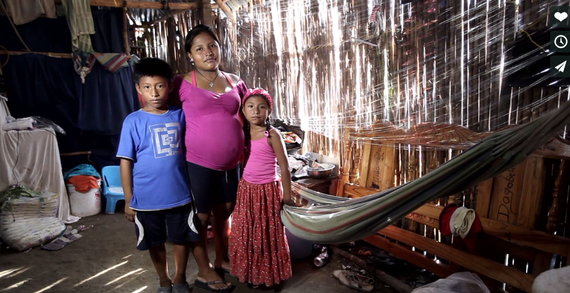Impressive gains have been made in maternal and child health over the last decade. Thanks to the tireless efforts and cooperation among policymakers, health workers and researchers, more women are surviving childbirth, and millions more children around the world are living past their fifth birthday. However, overall improvements can hide the broad gaps that still exist within country borders and sometimes within communities themselves.
Take a region like Central America. It's a part of the world that has experienced significant growth over the past decade, and the health of the overall population has improved greatly. Still, there are pockets of the region where vulnerable communities--especially indigenous and poor people in rural communities--are still suffering from very poor health and nutrition outcomes.
The Mesoamerica Health Initiative was developed to bridge those gaps so that women, newborns and children throughout the region can access the health services they need. The Initiative is a partnership between the Inter-American Development Bank, the Bill & Melinda Gates Foundation, the Carlos Slim Health Institute, the governments of Spain, seven Central American countries and the State of Chiapas in Mexico.
When the Initiative began, only 20 percent of pregnant women among the poorest quintile of the population in Guatemala were able to attend pre-natal visits with a skilled provider. In parts of Belize, only 33 percent of women were breastfeeding their newborns exclusively. Anemia in children aged 0 to 11 months was prevalent throughout the poor populations in the region. And access to contraceptives for women who wanted to plan their families and space their births was uneven: while condoms were available in 100 percent of facilities in Panama on the day of the survey, oral contraceptives were accessible at 75 percent of surveyed facilities and IUDs at a dismal 37.5 percent.
The Initiative has been working with country governments to improve the supply, demand and service delivery platform to provide better health for these populations. It is early, but we have seen considerable progress toward closing health gaps since the Initiative started. For instance, in the State of Chiapas in Mexico, the percentage of health facilities able to reliably provide resources for effective prenatal and postnatal care rose from 3.6 percent to nearly 46 percent. In Honduras, the percentage of micronutrients available to children from 6 to 23 months--a critical intervention against anemia--has gone from zero to 93.5 percent. In Nicaragua, transportation vouchers have been provided to more than 4,000 expecting mothers in remote places to reduce barriers for them to access care.
This notable progress has been made possible through a strong partnership that has established attainable, yet ambitious, health goals--with a focus forward on performance improvement and measuring and recognizing progress along the way.
This month, experts will convene in Mexico City at the first-ever Global Maternal Newborn Health Conference, providing an opportunity for the global community to focus on the concrete, life-saving steps we can take for women and their newborns. It's the first major gathering since the U.N. General Assembly meetings in September, and it marks an important moment in time for the global community. The quality of services available to women and newborns--and the equitable access to those services--will be a key point of discussion.
World leaders have set ambitious and achievable goals to eliminate extreme poverty and improve health, including elimination of preventable maternal and newborn mortality by 2030. We know what works and how to get the job done. The road maps to achieve this progress are already available. Bringing together the Ending Preventable Maternal Mortality vision for action and the Every Newborn action plan pave the way for countries to implement proven interventions to save lives for both mothers and newborns at the most fragile times: during pregnancy and delivery, and in the period following childbirth. And more must be done to scale up family planning because helping women limit or space their pregnancies protects their health and that of their newborn, saving lives.
The Mesoamerica Health Initiative is showing the world how smart, concrete actions make a difference. To do even more, we must work together to ensure equitable access to quality health services at all stages of life, for all people, no matter where they live. When women know they can count on health facilities to deliver the services they and their families need, and do it respectfully, they will be more likely to take advantage of that care. And as a result, more women and newborns will survive and have the chance to thrive.
